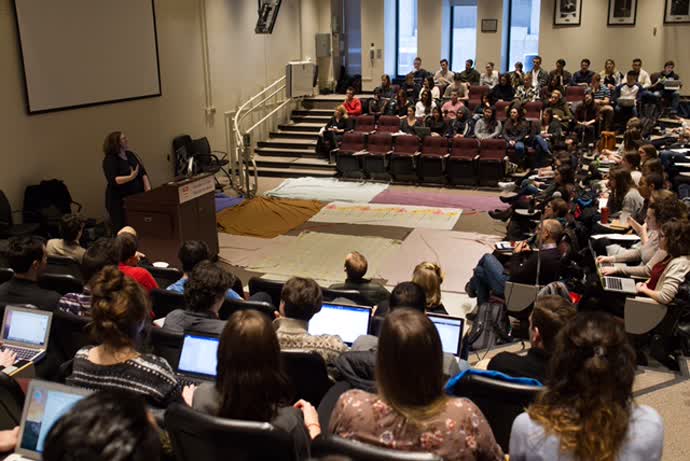
UAlberta Law's Hadley Friedland co-teaches indigenous law integration course at McGill University.
The first week of 2017 was a busy one for UAlberta Law Visiting Assistant Professor Hadley Friedland, who spent it lending her knowledge and expertise to McGill University law students.
Friedland was invited by McGill to co-instruct a one-week intensive course for first-year law students on Indigenous law.
The course, developed by Friedland, expands on the goals of UAlberta Law's newly-revamped Foundations of Law, a mandatory course for first-year students which includes material on Indigenous laws and Canada's historic relationship with Indigenous peoples.
Both initiatives are a response to Call to Action #28 of the final report of the Truth and Reconciliation Commission that Canadian law schools ensure lawyers receive appropriate training in Indigenous laws, Aboriginal-Crown relations, and anti-racism and cultural competency training.
Associate Professor Hoi Kong of McGill joined forces with Friedland to co-teach the course. Dr. Val Napoleon, Law Foundation Chair of Aboriginal Justice and Governance and Director of the Indigenous Law Research Unit at the University of Victoria joined them for the final two days.
"Professor Friedland was invited because she is a fantastic teacher and outstanding scholar who is deeply knowledgeable about the methodology that the students learned," said Professor Kong.
Similar to the activity UAlberta Law redesigned and implemented in September, the week at McGill began with a law-focused KAIROS blanket exercise, and drew on and adapted key aspects of Friedland's Indigenous Laws: Questions and Methods course, which last semester saw UAlberta Law students participate in a Cree law moot.
Students also learned challenges to and methods of engaging with Indigenous legal traditions, and then practiced applying Cree legal principles to a case study involving a safe consumption site program, the same issue McGill used in its first integration week in the fall, which introduced students to common law and civil law concepts.
Friedland said that the course is about teaching students to learn how to learn and listen so they can identify Indigenous laws outside of the classroom.
"The TRC clearly called on law schools to teach Indigenous laws, but the big challenge is - how do we do this respectfully and effectively at this point in history? What do we need to learn - and unlearn? This course - for 180 first-year law students - involved a lot of careful thinking and preparation, and, in the end, taking a risk - as law professors, as law students, and as an institution - to respond to that call. The course was well-received by students, who engaged in incredibly thoughtful and creative ways. It will hopefully serve as a model we can learn from and build on in the future," she said.